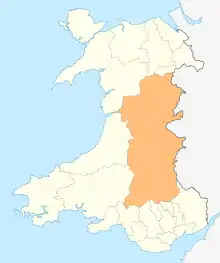Newtown railway station (Wales)
Newtown railway station (Welsh: Y Drenewydd) is a railway station serving Newtown in Powys, Wales.
.jpg.webp) | |
| Location | Newtown, Powys Wales |
| Coordinates | 52°30′44″N 3°18′43″W |
| Grid reference | SO111913 |
| Managed by | Transport for Wales |
| Platforms | 2 |
| Other information | |
| Station code | NWT |
| Classification | DfT category E |
| History | |
| Original company | Oswestry and Newtown Railway |
| Pre-grouping | Cambrian Railways |
| Post-grouping | Great Western Railway |
| Passengers | |
| 2015/16 | |
| 2016/17 | |
| 2017/18 | |
| 2018/19 | |
| 2019/20 | |
| Notes | |
Passenger statistics from the Office of Rail and Road | |
History
Newtown was the last major station before Moat Lane Junction where the Mid-Wales Railway, to Llanidloes, Rhayader, Builth Road and on to Cardiff (with a branch to Brecon), diverged from the Cambrian Railways main line (today's Cambrian Line) to Machynlleth and Aberystwyth.
The station was the eastern terminus of the Newtown and Machynlleth Railway opened by the Countess of Londonderry at Machynlleth station on 3 January 1863.[1] It was also originally served by the (now mostly defunct) Llanidloes and Newtown Railway (opened in 1859 and initially isolated from the rest of the Welsh railway system) and the Oswestry and Newtown Railway (opened in 1861). All were subsequently subsumed into the Cambrian by 1865.
The Mid-Wales line passenger service was withdrawn on 31 December 1962, though trains to and from this route latterly started and terminated at Moat Lane Junction. Services to Oswestry and Whitchurch via the former O&NR Cambrian main line ended in January 1965, when the route east of Buttington closed to passenger traffic as a consequence of the Beeching Axe.
Facilities
_railway_station_in_2008.jpg.webp)
The station currently has two through platforms, which are used separately for trains in either direction. The station is usually used as one of the passing points for trains on the Cambrian Line as it is a single track. The station has one west facing bay platform/siding which is periodically used as a storage point for Network Rail's Departmental trains.
There is a Transport for Wales appointed "Station Agent" with full ticket issuing facilities in the main building. This also houses a Grill Restaurant (Station Grill) and a computer training centre. Train running information is provided by digital CIS displays, automatic announcements and customer help points on both platforms. Step-free access is only available for platform 1 (eastbound).[2]
Services
Trains run from here westwards to Machynlleth and then either Aberystwyth or Pwllheli via Barmouth (most trains convey a portion for both routes) and eastwards to Shrewsbury & Birmingham International. There is a basic two-hourly service each way – on weekdays and Saturdays there are also some additional Shrewsbury to Aberystwyth services during the mornings and evenings. On Sundays there is a two-hourly service on the Shrewsbury – Aberystwyth axis, but only a limited service along the coast to/from Pwllheli (three in summer and one in winter).[3]
| Preceding station | Following station | |||
|---|---|---|---|---|
| Transport for Wales Cambrian Line | ||||
| Historical railways | ||||
| Scafell Halt Line open, station closed |
Cambrian Railways Oswestry and Newtown Railway Newtown and Machynlleth Railway |
Abermule Line open, station closed | ||
References
- Engineering Timelines – Talerddig CuttingEngineering Timelines; Retrieved 6 May 2016
- Newtown station facilities National Rail Enquiries
- Table 76 National Rail timetable, May 2017
Further reading
External links
![]() Media related to Newtown (Powys) railway station at Wikimedia Commons
Media related to Newtown (Powys) railway station at Wikimedia Commons
- Train times and station information for Newtown railway station (Wales) from National Rail
